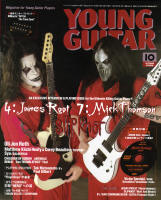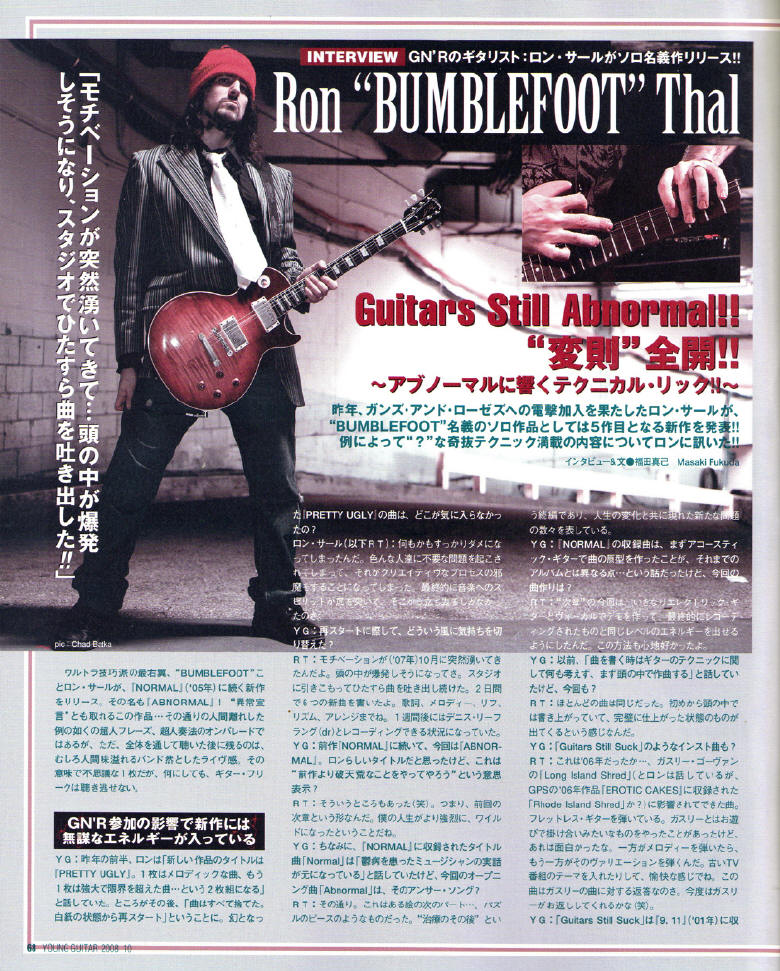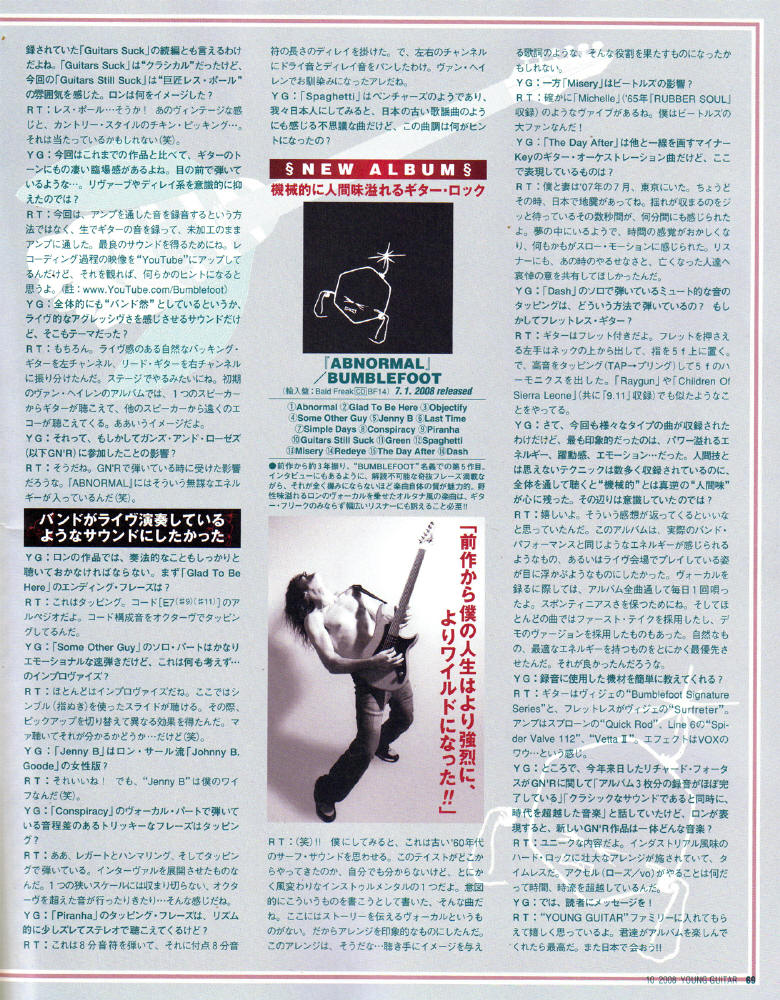 |
YOUNG GUITAR magazine (Japan) OCT 2008 |
  |
|
 |
YOUNG GUITAR magazine (Japan) OCT 2008 |
  |
|
Original English interview:
Q01: When we had an interview with you early in last year, you were going to
make 2 albums (one of them would be melodic, and the other would be immense and
over-the-limit scale) called "PRETTY UGLY". However, later on, you told us that
you have thrown all the songs away you've had at that time. What was wrong with
them?
There was really anything wrong with the songs. There were people that were
making a lot of unnecessary drama and problems, and it was getting in the way of
the creative process. It reached a point where the spirit of the music was so
weighed down, I had to walk away from it.
Q02: How did you change your mind to make the new album from the scratch again?
It just came to me, in October. I started feeling like my brain was going to
explode, I locked myself in the studio, and songs started pouring out. I had
six new songs written in two days, all the lyrics, melodies, riffs, rhythms,
arrangements. After a week, I was ready to start recording with drummer Dennis
Leeflang.
Q03: Your latest album is called "ABNORMAL". This title sounds very Ron-ish
title as your last album ("NORMAL"). Did you mean "it's going to be wilder than
former 'NORMAL'"?
Haha, yes, that was part of it.
Q04: If not, what is the theme of this album?
It was the continuation of the story, the next chapter. Life had definitely
become more intense and wilder.
Q05: You told us that the title track "Normal" (album "NORMAL") is based on the
story of a musician with depression. Is "Abnormal" the answer song to "Normal"?
It's like the puzzle piece that builds the next part of the picture. It's the
continuing story, "off the medication," and all the new issues that came with
the changes in life.
Q06: You mentioned that you had made the basic structures of the songs with the
acoustic guitar for "NORMAL". How was the songwriting process this time?
For the "Normal" CD, we started with acoustic guitar versions of the songs and
build off them. For "Abnormal," we went straight to laying electric guitar
tracks and vocals, and making demos of the songs with the same energy the final
recordings would have.
Q07: You've also told us that when you write a song, you don't think about
guitar technique. You just compose it in your head. Was that same this time?
For most of the songs, it was the same, writing in my head. For most of the
songs, it was like the songs were already written and just came out of my head
complete.
Q08: How about the instrumental like "Guitar Still Suck"? Do you write it in
your head first?
Yes, and that was an older song. I wrote that songs around 2006. It was
inspired by Guthrie Govan's "Long Island Shred" song, that I played fretless
guitar on. When Guthrie and I jam together, we sometimes have this playful
back-and-forth, where one of us will play a melody and the other will make a
variation. Sometimes we do it with theme songs from old TV shows, it's pretty
funny. So, it's like "Guitars Still Suck" is the playful variation of "Long
Island Shred," it's my response to his song. Now it's his turn, haha!
Q09: By the way, this "Guitar Still Suck" (you once played this song for our DVD
before) must be a sequel to the "Guitar Suck"(9.11), right?
Yes, the Guthrie inspired sequel to "Guitars Suck", haha.
Q10: Musically, "Guitar Suck" had a classical image to me. This "Guitar Still
Suck" reminded me of Mr. Les Paul' s playing style. How about you? What image
did you have for this song?
Les Paul, yes! That vintage, country-style chicken-picking style...
Q11: About the sound of this album. This has a realistic atmosphere on the
guitar tones more than ever compared to past albums. I can feel that you are
playing right in front of me. Did you try not to use reverb or delay effects a
lot?
For the sound, I "reamped" the guitars. Instead of recording the sound coming
through the amp when I played, I recorded the actual raw guitar, and would send
the raw track to the amp later. This way, I was able to try different amps,
microphones and settings after all the tracks were recorded, and get the best
sounds for the songs. I made videos of the recording process, they're at
www.YouTube.com/Bumblefoot
Q12: As a whole, it seemed to be pretty aggressive like a band performing a
live. Was that your theme of the album, too?
Yes, I wanted it to be raw, natural, rhythm guitar on the left, lead guitar on
the right, like on a stage. I like how old Van Halen albums would have the
guitar on one speaker, and the echo in the distance on the other speaker.
Q13: Was that aggressiveness inspired by Guns 'N' Roses?
I think so. I think years of playing with Guns N' Roses had its effect.
There's more reckless energy in a lot of the music on Abnormal.
Q14: Now, I'd like to ask you about guitar techniques on this album. "Abnormal": There are technical guitar parts in the intro, the section
before the solo part, and the ending. Are they chromatic phrases by tapping?
They have very complicated rhythm patterns. What is the time signature?
It's 4/4... there are accents and grouping that can make it feel like odd
timing, but it's 4/4.
Q15: "Glad To Be Here" : Did you play both hand tapping or some kind of unusual
playing on the ending phrase?
Yes, it was tapping, an arpeggiated E7#9#11, tapping octaves of each note.
Q16: "Some Other Guy" : This one has a very emotional solo part including fast
licks. Was that a genuine improvisation?
Much of it was improvised, yes. There is some thimble technique in the solo,
using different pickups to get a different effect from the thimble. With the
bridge pickup, you hear the high notes of the thimble. But when you switch to
the neck pickup, the thimble changes the pitch of the fretted notes, as if you
were shortening the length of the string, which makes fretted notes have a
higher pitch.
Q17: "Jenny B.": Is this a female version of "Johnny B. Goode"? This solo must
be an improvisation and rocks hard with such an attitude. When you record this
kind of solos, do you usually keep the first take?
haha, "Jenny B" is my wife :) It's all on fretless guitar. Sometimes I'll
keep the ideas from the first take, but do additional takes to see if I can play
them better.
Q18: "Simple Days": The verse part has a very strange rhythm pattern. Is the
beat pattern something like "3 + 3 + 2"? Or is it just normal "4/4" and only the
drum beat is different from other instruments?
It's 4/4. Does it really sound strange to you? I felt like this song was very
"normal," almost like a ballad. Not a soft ballad, but a song with the
sensitivity of a ballad.
Q19: "Conspiracy": The verse of this song has some tricky phrase with big
intervals. Did you play that by tapping?
Yes, it'smostly legato hammer-ons and tapping. The riff has inverted intervals,
where the notes have big jumps through octaves instead of a tight piece of a
scale.
Q20: "Piranha" has a tapping phrase from 0'50". It sounds like the phrase is
panned to stereo. It also has a phrase which is off the beat a little bit. (If
you recorded them at one time, you must have used a panning guitar, correct?)
Assuming that you overdubbed the panned part, it must be difficult to play a
little bit late to the exact beat, right? By the way, is the solo part of this
song all tapped with both hands?
I played eighth notes, and set a delay to repeat the notes as dotted eighth
notes. Similar to Van Halen, Pink Floyd, U2 guitar parts. I played the guitar
on the left, the delay was on the right, it filled the spaces of the eighth
notes. There's no delay effect on the main solo, it's all just tapping with
both hands.
Q21: "Spaghetti": This song sounds like The Ventures. To me, as a Japanese, it
also reminds me of some old -time Japanese popular songs. What was the
motivation of making this song?
Haha, yes! It has that old 60's surf sound to it. I don't know where this song
came from, it's just one of those quirky instrumental songs, where I really try
to compose it, like the song R2, Guitars Still Suck, or songs off the old
"Adventure Of Bumblefoot" album. I sometimes feel like I'm writing a score for
a movie when I make instrumental songs. Or maybe, it's because there are no
vocals to tell the store, I put more into the arrangement to try and make you
picture something, as lyrics would have.
Q22: "Misery" : Is this song influenced by The Beatles?
I'm a big Beatles fan, I've always loved the Beatles. This song definitely has
that "Michelle" vibe to it.
Q23: "The Day After": This song is rather different from others. It is in minor
key and heavily orchestrated with guitars. What did you try to express through
this song?
My wife and I were in Tokyo in July 2007, during the Japan earthquake. We
waited for it to end, and seconds dragged like minutes. Like a dream, when your
sense of time is displaced, and things feel like slow-motion. This is was what
I want the listener to feel. The helplessness, and mourning the losses.
Q24: "Dash": A section after 2'28"......how did you play the muted phrase? Did
you used a fretless guitar?
It's a fretted guitar. The fretting hand is over the neck, 3rd finger resting
on the 5th fret. Tap a high note onto the 5th fret harmonic, then hit your
fretting hand 2nd and 1st fingers onto the neck to make the thumping sounds. I
use a similar technique in the solo at the end of the song "Raygun" and in the
solo of the song "Children Of Sierra Leone" on the "9.11" album.
Q25: On the whole, "ABNORMAL" contains various types of music. What I felt the
strongest from this album were powerful energy, lively feeling, and emotion.
There are so many superhuman guitar techniques, but I still feel the human touch
very much from the music. Were you conscious about that? Did you intend to have
that kind of feeling?
Thank you! I was hoping something like this would come through. I wanted the
album to feel like something you'd see live, where you'd get the same energy,
where you would picture the band playing live as you listened. When I recorded
the vocals, I would sing the entire album straight through without stopping,
once each day, to keep things spontaneous. And for many of the songs, I used
the first take. For some, I even used the scratch track, it had the most
natural feel and the best energy for the song. There are also videos of the
vocal recordings at www.YouTube.com/Bumblefoot
Q26: Please let me know your guitars, amps and effects on this recording
(companies, makers, as much as you know).
I used a Parkwood PW370M acoustic guitar, Vigier "Bumblefoot Signature Series"
guitar, and Vigier Surfreter fretless guitar, with DiMarzio pickups - Tone Zone
in the bridge, Chopper in the neck. I used a Splawn Quick Rod 100W head and
4x12 cabinet, a Line 6 / Spider Valve 112 tube combo amp, and Line 6 Vetta2 2x12
combo. I used a Vox wah pedal. Microphones I used to mic the speaker cabinets
- Shure SM57, Audio Techinca AT3060, Cascade FatheadII and Cascade Victor ribbon
mics.
Q27: By the way, when Richard Fortus visited Japan in this past spring, he was
talking about the latest album of GN'R. According to him, the band already have
recorded so many materials that you can make at least 3 albums. He also said
that soundwise it's classic, but at the same time it has music that reaches
people beyond periods and generations. From your point of view, what do you take
the latest GN'R material?
It's unique. Industrial-flavored hard rock with epic arrangements, lots of
guitar, and Axl's voice, which is one of a kind. It's timeless - everything Axl
does is timeless. I don't think he'd settle for anything less, and he inspires
me to demand the best of myself.
Q28: Finally, please give a message to YG readers, waiting for your latest
material "ABNORMAL"!
It's always a pleasure to be part of Young Guitar, thank you to the magazine and
the readers! I hope you all enjoy the album, and I hope to see you all in
Japan. Take care!
Ron
AUG 14, 2008